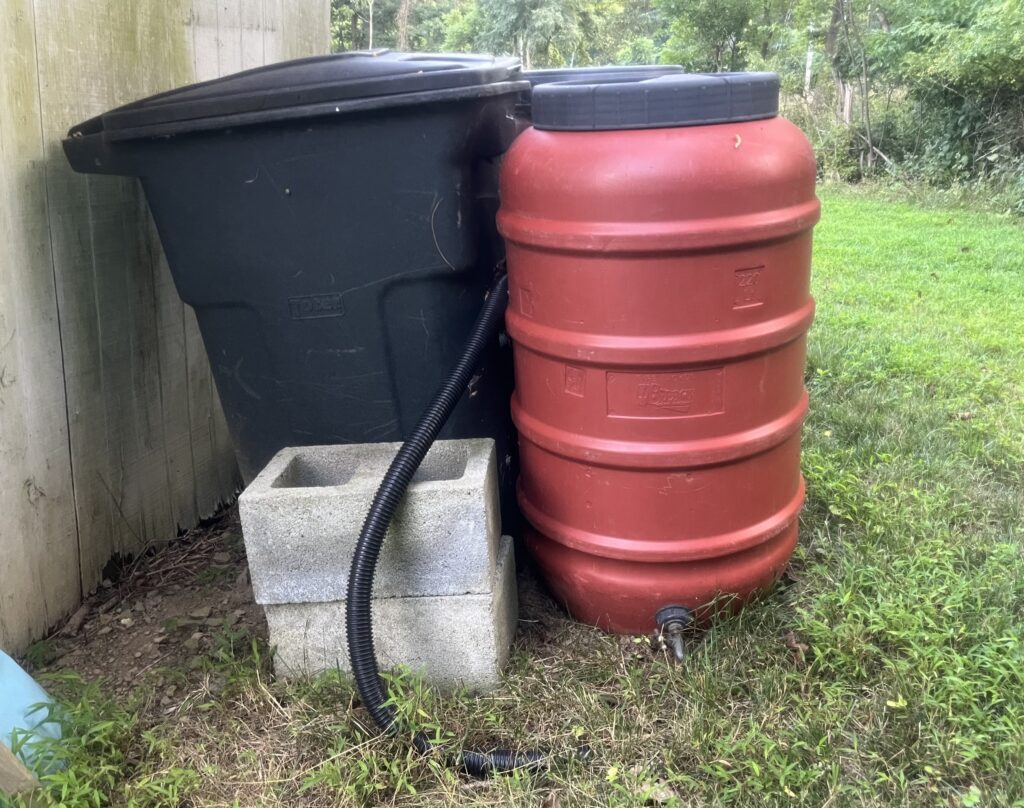Earlier this month, Tropical Storm Debby brought heavy rainfall to the Mountain State. Some rainfall enters the soil, but a lot of it collects pollutants and ends up in waterways.
By installing rain barrels, farmers and gardeners can collect rainwater and ensure it goes directly to their crops. Eastern Panhandle Reporter Jack Walker spoke with Colleen Seager, a stormwater technician for the City of Martinsburg, about how to install and use rain barrels.
This interview has been edited for length and clarity.
Walker: What are rain barrels, and how do you use them?
Seager: So rain barrels, you can buy them at Lowes or Home Depot. Even Tractor Supply has barrels and kits that you can get. But it’s essentially like a food-grade barrel. You can buy a kit for it and cut holes in it and install it yourself in your home. It attaches to your gutter and collects any of the water that hits your roof that would go into the ground. You can just keep it in. I’m not too sure how big these barrels are. I want to say they’re about 50 gallons, and it stores the water there for you. You can use it to water your garden whenever you need it. Also, if it gets full, it has an overflow. So it infiltrates through the ground instead of turning into runoff, which can pick up pollutants. We try to avoid any unnecessary stormwater runoff.
Walker: Can you expand on that? What are some benefits of using rain barrels in gardening and agriculture?
Seager: Sure. So rain barrels, you can use them for watering your garden. They can be really good for collecting rainwater so that [it doesn’t] go down our stormwater infrastructure. It’s basically a great way to keep your garden and our watershed healthy. So, not only can it help lower the cost of your water bill, but it can also benefit you and your community in tons of ways. Collecting rainwater, it reduces the amount of stormwater that enters the storm system, and that can decrease the burden on the infrastructure, which minimizes risks of a combined sewer overflow, which can obviously be bad for our watershed. Letting it infiltrate the ground instead of turning into runoff will minimize pollution. That’s always appreciated.
From a stormwater perspective, if it turns into stormwater it can pick up trash, oil and other toxic pollutants before it reaches our stream. We have Tuscarora Creek and Dry Run in the city of Martinsburg, so we primarily try to protect from pollutants from getting into them. Any time rainwater is collected, it’s slowed down and it can prevent pollutants entering the stream. Whether it’s sediment and nutrients or oil and heavy metals, we want to try to keep that stuff out of our creeks. So collecting it not only helps prevent pollution, but you can also use it to have a really healthy garden. It’s the purest form of water, so it doesn’t have any added chemicals or anything like that. That’s exactly what your plants want to thrive. Say you have water coming down from your roof and it’s infiltrating down into the ground and causing some flooding issues in your basement. If you have a rain barrel, it can fix that for you. Also, you can have a garden that’s nice and lush and beautiful.
Walker: How has the City of Martinsburg been spreading awareness about rain barrels and their benefits?
Seager: So the city of Martinsburg typically hosts two workshops a year at The Martinsburg Roundhouse or the farmers market, where [residents] that live within the city limits can get free rain barrels if they sign up. We typically have someone reach out to the local newspaper. Or on social media we’ll post that there, or on our website. We’ll update that whenever we have rain barrel workshops. The county also often will raffle off free rain barrels. The [Berkeley County Public Service Storm Water District], they often raffle off their rain barrels. You can give them a call if you don’t live within city limits. Eventually, one day, we would like to have the city and the county work together for an event where we can have folks come out and paint rain barrels. It’d be like a really fun community activity where people can come out and learn about how they work, how to install them, how to keep them safe during the winter time and make them last as long as you possibly can. So we’ll try to have more events in the future so people can come out and do that or just learn about it. They don’t have to sign up for a rain barrel. They can just come out. Anybody can come out and learn about what they’re good for and how to make them work for whatever they need them for, whether it’s their garden or if they’re having some damp basements or anything like that. We typically try to host those events twice a year.
For more information on stormwater education and rain barrel workshops in West Virginia’s Eastern Panhandle, visit the Martinsburg Stormwater Management website.






















